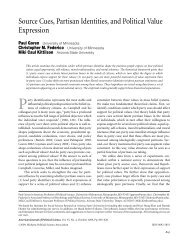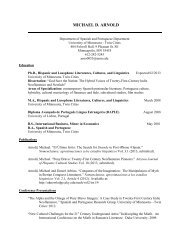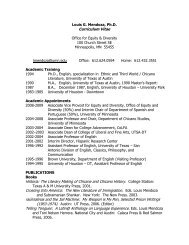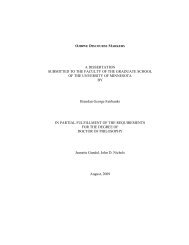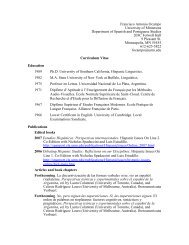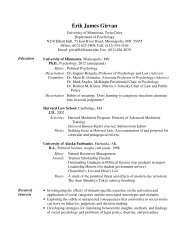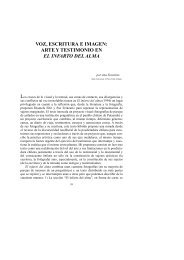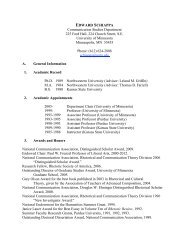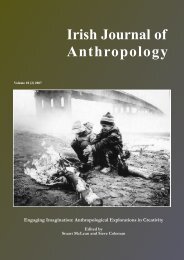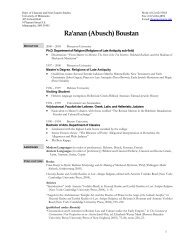De/Re-Constructing Borders - University of Minnesota
De/Re-Constructing Borders - University of Minnesota
De/Re-Constructing Borders - University of Minnesota
You also want an ePaper? Increase the reach of your titles
YUMPU automatically turns print PDFs into web optimized ePapers that Google loves.
Afrikaner). The border that stands between brothers, Dirk and Ouboet, is clearly seen in<br />
this exchange about Dirk’s teaching at a black school and their different notions <strong>of</strong> race:<br />
OUBOET: ‘n Onderwyser?! [A Teacher?! So, you’re a master now.]<br />
DIRK: Mnumzana. [isiZulu for teacher.]<br />
OUBOET: Mnumzana?<br />
DIRK: I taught black children.<br />
OUBOET: ‘n Kaffer skool? [A kaffir school?!]<br />
DIRK: A school, Brother, for children.<br />
OUBOET: Kafferkinders. [Kaffir children.]<br />
DIRK: Kinders.<br />
OUBOET: Kafferkinders (116).<br />
In tangible ways, and at the very site <strong>of</strong> language and communication, the political<br />
tensions <strong>of</strong> apartheid during the 1970’s and 80’s manifested themselves on the bodies <strong>of</strong><br />
the Afrikaner people. The once unified “nation” is beginning to disintegrate and<br />
Opperman, having established the system in his play, starts to highlight the cracks in its<br />
armor.<br />
At the closing <strong>of</strong> the play, Opperman quotes a verse from renowned Afrikaans poet<br />
and playwright, N.P. Van Wyk Louw, who reminds us that “this land was not purchased/<br />
merely on loan” (129). The notion <strong>of</strong> borrowed land, and borrowed time, is especially<br />
poignant in contemporary South Africa. Nelson Mandela lived on borrowed time for 27<br />
years while imprisoned on Robben Island. The time has now come for the Afrikaner to pay<br />
up, and payment is taking effect at the very site <strong>of</strong> identity: land. Under the recent Land<br />
Commission, properties that originally belonged to indigenous tribes are now being<br />
redistributed to their original owners. Afrikaner farmers, who have worked the land for six<br />
generations, are being required to sell their farms to the government for reappropriation. 8<br />
Opperman leaves the Afrikaner at this moment <strong>of</strong> landlessness and uncertainty. As<br />
we see the image <strong>of</strong> Arnold, forlornly staring at a pile <strong>of</strong> stones on the edge <strong>of</strong> Donkerland<br />
where Pieter de Witt the patriarch first planted his marker over 300 years before, we hear<br />
the female narrator’s final speech:<br />
... while [Arnold] sat there, a snail slithered across a stone and left a little trail...a<br />
short hyphen <strong>of</strong> silver in the mighty wilderness; and then it hit him: we...we are<br />
5



